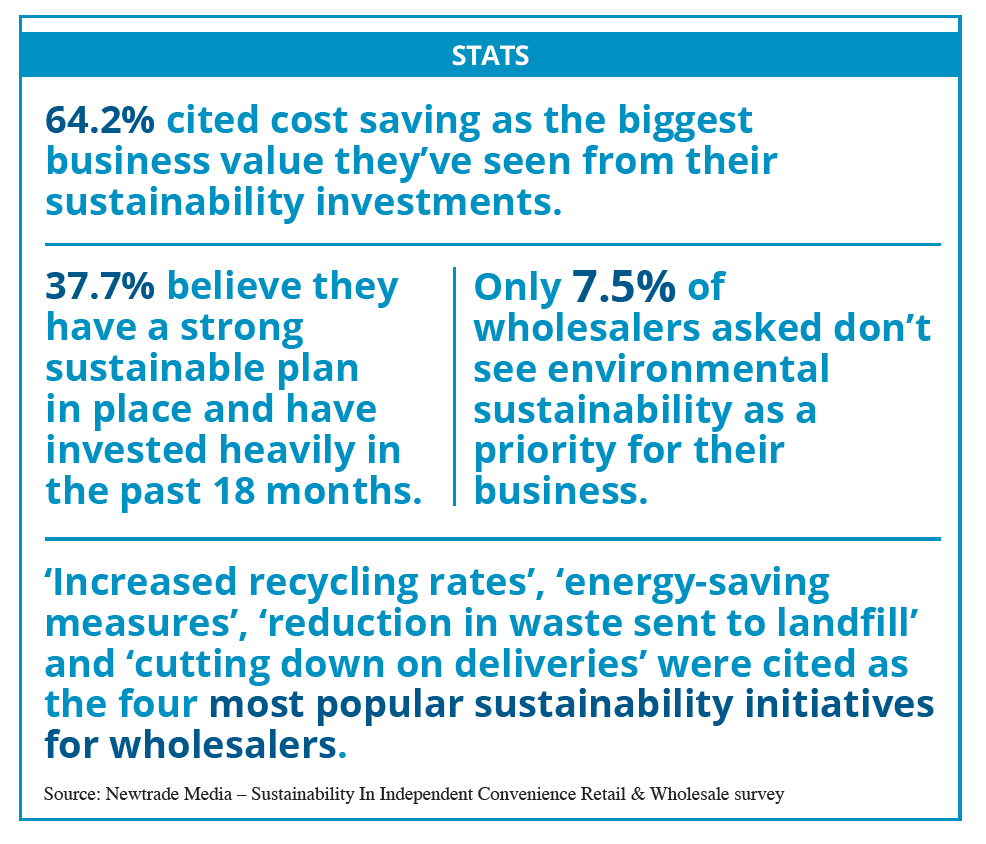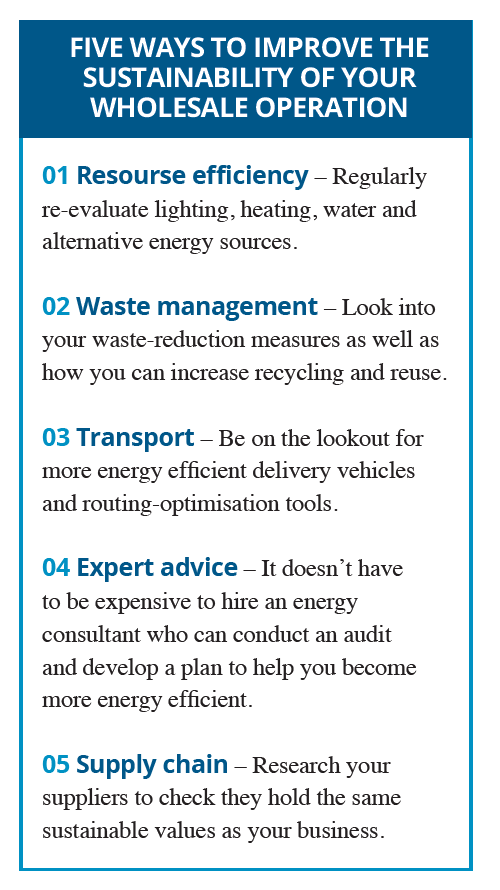With normality slowly returning to society, sustainability is back on the agenda of businesses across the UK. One such company is JTI, which last year published its UK environmental plan. This included a commitment to net zero carbon by 2030, 20 years ahead of the government’s deadline, as well as ambitious targets to reduce its waste, energy and emissions.
The tobacco manufacturer recently sat down with a number of wholesalers and associated trade associations to better understand where the wholesale sector is on its path to greater environmental sustainability.
JTI’s ambition has been to find out about what progress has already been made, future environmental plans and to understand how it can help support its wholesale partners from an environmental perspective.
Ed Merrett, wholesale, convenience & gas sector lead at JTI, said: “Sustainability is of increasing importance to JTI; last year we published our ambitious UK 2030 Environmental Plan. Alongside setting environmental targets for our own operations, we understand that one of the best ways to further reduce our environmental impact is to work with our supply chain and our customers – including the wholesale sector – to support their own journeys to becoming more environmentally sustainable, and that’s why we were delighted to instigate these workshops.”
 Prior to the roundtables, Better Wholesaling Insight conducted some sustainability research in partnership with JTI to discover wholesalers’ attitudes, and investments in sustainability as well as the challenges they face. This included the largest-ever sustainability survey in the sector, representing 423 depots – around 10% of the UK total – with 37.7% believing they have a strong sustainable plan in place and have invested heavily in the past 18 months, with only 7.5% saying they don’t see it as a priority for their business.
Prior to the roundtables, Better Wholesaling Insight conducted some sustainability research in partnership with JTI to discover wholesalers’ attitudes, and investments in sustainability as well as the challenges they face. This included the largest-ever sustainability survey in the sector, representing 423 depots – around 10% of the UK total – with 37.7% believing they have a strong sustainable plan in place and have invested heavily in the past 18 months, with only 7.5% saying they don’t see it as a priority for their business.
“It has never been more important for companies to think and act sustainably,” says Ruth Forbes, head of responsible business projects at JTI. “Reducing our environmental impact is a journey we share with our employees, suppliers and customers – only by acting together can we ensure maximum impact, and that is why we wanted to hold these discussions. We wanted to hear, and then share with a wider audience, the steps wholesalers can take to improve their environmental impact.
“At JTI we are working to reduce the environmental impact of our product portfolio. This new approach has seen our tobacco business committing to reducing its packaging (including plastic), ensuring it’s 85% reusable or recyclable by 2025, rising to 100% by 2030.”
“We’ve installed LED lighting throughout all of our depots after testing it in one location initially and it’s worked really well,” explained Dipak Karia, general manager at Dhamecha, in the first roundtable. “We are constantly evaluating our sustainability objectives and have done things such as increasing recycling rates and reducing our waste.”
These findings from Karia tie in with the survey results, with ‘increased recycling rates’, ‘energy-saving measures’, ‘reduction in waste sent to landfill’ and ‘cutting down on deliveries’ cited as the four most-popular sustainability initiatives for wholesalers.
However, like all industries, wholesalers encountered issues in their quest to become more energy efficient, with the high cost of sustainable investments (75.5%) and lack of environmentally friendly substitutes (52.8%) the two most popular answers in the research.
Meanwhile, 49.1% of the survey said there was not enough demand from retail customers. This is a stat echoed by Zahir Fazaldin, property and transport controller at Bestway, in the roundtable: “There needs to be more education and work across the entire supply chain for it to properly work.” Bestway trading director Richard Booth added: “It’s also fair to say the entire supply chain is environmentally conscious, but it can sometimes be further down in a list of priorities, especially after the past 18 months.”
United Wholesale Scotland (UWS) was also involved in the discussions, and the Glasgow-based company’s managing director, Chris Gallagher, explained how it takes a proactive approach to sustainability. “Esos Phase 2 and 3 are key result areas for UWS and we hire external consultants to measure how we’re doing.”
UWS appointed The Energy Hub as con-sultants to complete its evaluation, which led to a report that offered the wholesaler KPIs and a research plan, as well as next steps and key information of what was required to become more energy efficient. “This report then helps us to easily track our progress,” added Gallagher.
A few of the changes UWS has made to its operations include motion sensors and LED lighting, replacement boilers, timings on its blow heaters and new electric forklifts, as well as the optimisation of vehicle routing and new DAF trucks with Euro 6 engines – models that are claimed to be the most efficient within the industry.
“We’re aiming to become one of the most sustainable wholesalers in the country, but we’re aware we’re lucky in that we have the workforce and size to track our progress. It’s my belief that certain smaller wholesalers may not have this and will need further help and guidance in the future to become sustainable,” added Gallagher.
UWS is a member of the Scottish Wholesale Association (SWA), and its chief executive, Colin Smith, explained how it is also taking a proactive approach to sustainability after recently completing the first phase of a long-term project that aims to encourage the Scottish wholesale industry to become greener and more sustainable.
With the aim to decarbonise the wholesale food supply chain and achieve net-zero emissions by 2045, the SWA will focus on distribution fleets – with a particular focus on hydrogen fuel cell (HFC) and electric vehicle (EV) technology in this first phase of the decarbonisation of the wholesale industry project. It has recruited a graduate from Strathclyde University for an initial 12-week placement to carry out the first phase.
 “We’re hugely excited to be driving this vital project,” said Smith. “While there are various decarbonisation projects in place in Scotland, the SWA – through our Decarbonisation of the Wholesale Industry Project – has the opportunity to be the first organisation in the UK to investigate and implement the private commercial use of HFC technology and/or EV technology at a sector-wide level.
“We’re hugely excited to be driving this vital project,” said Smith. “While there are various decarbonisation projects in place in Scotland, the SWA – through our Decarbonisation of the Wholesale Industry Project – has the opportunity to be the first organisation in the UK to investigate and implement the private commercial use of HFC technology and/or EV technology at a sector-wide level.
“As a result, the Scottish wholesale industry could become Scotland’s first ‘commercial testbed’, particularly for HFC. Carrying out this project on an industry scale will generate bigger benefits to our members than if they do it alone – not only in time and cost savings, as we are conducting the research on their behalf, but also in hopefully being able to attract funding.”
Now in the middle of its second phase, the SWA will examine emissions generated from buildings, including warehousing, cold storage and offices, and the energy consumed by them. A questionnaire has been sent out to the membership, and the results, combined with those of phase one, will enable the SWA to calculate the carbon footprint of the wholesale sector in Scotland. “All of this gives SWA a baseline and allows us to draw a route map to net zero for our sector, which we will then present to the Scottish government and its agencies,” said Smith.
South of the border, James Bielby, chief executive of the Federation of Wholesale Distributors (FWD), also takes an interest in sustainability. “We fully accept and endorse our sector’s role in delivering the necessary actions needed on sustainability. We have a sustainability committee whose role is to talk legislation and policy such as DRS and packaging reforms and how best we can represent the industry in government,” he stated.
With the FWD and SWA taking alternative approaches, but both putting a major focus on sustainability, it shows the wholesale industry is on a clear path to a more energy-efficient future. With this information, along with the discussions it had with Bestway, Dhamecha and UWS, JTI is now better set to understand and support its wholesale partners from an environmental perspective.
“I feel really excited about everything shared during our discussions. For me, I’ve learnt that JTI needs to be a bit louder about the environmental progress we’re making, especially as it relates to our wholesale partners,” concluded Forbes.







